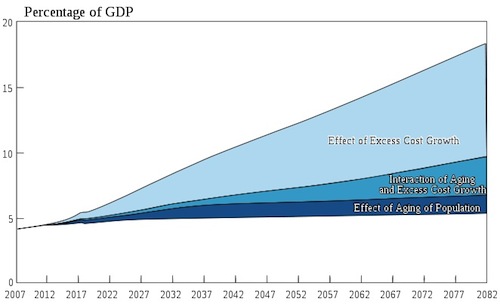
(continuing discussion of Chuck’s article, “6 Reasons Obama-Care Is Bad Medicine“)
5. Universal health care ultimately would transform legislators into quasi health care practitioners.
Chuck’s point here is brief enough to quote entirely:
With government-sanctioned universal health care, legislators would become quasi medical practitioners because they would lead and guide the government-controlled medical boards, personnel and policies that would oversee the program. That would include abortive and end-of-life counsel and services. Federal politicians would rely upon relatively few chief physicians (appointed mostly by them), who in turn would oversee and implement the medical policies and procedures that they felt were best for the country.
Chuck, Chuck, Chuck, I’m not sure how many different ways there are to say that this is not what we’re talking about.Nobody—let me state that more forcefully—NOBODY is discussing implementation of any kind of universal health care right now. Even the public option, if it completed a nefarious takeover of the whole insurance system, would only be a universal health coverage system (the difference between Canada and the UK, in other words).
This annoys Kevin the fact-finder. It annoys him greatly. Positioning Obamacare as something that it’s not is intellectual dishonesty. It might even be regular dishonesty. As if to hammer the point home, he even alludes to everyone’s favorite nonexistent threat, the death panels. (Now they handle abortion, apparently, too!)
Okay, I’ll tamp down my annoyance for fear of getting a deconstructed face. Regarding his actual allegations, they seem to have no correlation to existing public health-care systems around the world. Confidentiality between a patient and his doctor is universally assured, unless I’m missing something. Chuck’s other suggestions are pure conjecture—the worst possible conjecture—of what a UHC system might look like. Since NOBODY is actually designing such a system at the moment, I can’t really say much more about it.
6. Universal health care would increase big government, and America would continue on the slippery slope toward socialism.
If you wanna make a voter scared of health-care reform, use the phrase “big government.” (For bonus points, add a “socialism.”) The division between liberal and conservative has often been defined as whether you think government does more harm than good. I’m actually a little amused by members of Congress railing about how awful government is—by extension, how awful they themselves are.
But let me lay off the snark. Chuck sez…
Our government already provides two medical coverage programs: Medicare (for senior citizens) and Medicaid (for low-income citizens). The president mentioned in his speech last week that those two programs are the greatest contributors to our skyrocketing deficit. So why not reform, improve and enhance those programs rather than create a third (or fourth or fifth) government medical bureaucracy called “universal health care”?
That’s not what it would be called, Chuck.
Anyhoo, Obama was right about that deficit thing…

Those programs do indeed need to be reformed, improved, and enhanced, with a quickness. Chuck is damn right. But then, all the magic tricks in the world don’t do one tiny measly bit for Americans who are neither old nor poor, and thus eligible for neither program. The question is what to do about the non-old-non-poor folks who are nonetheless in need of some choice health care. That’s a lot of Americans.
Is a new government program the answer? Hey, maybe not! Nobody needs convincing that government programs are, virtually by definition, inefficient and often quite silly. I can’t tell you how sure I am that, if a public option passes, Chuck and company will roll out one insane story after another of the system screwing patients and not working the way it should. This will certainly happen.
Does this mean the whole system will thus be a failure? No. But it’s a point worth taking that it’ll probably be a little bit ugly.
My thoughts, such as they are, for your logical distillation:
a) profit motive is not always the best motive to guarantee improvement. When it comes to health care, my take is that the US system is extremely high on profit motivation, and extremely low on the helping sick people motivation. While individual doctors may like making people well, insurance companies and pharmaceutical companies exist not to improve the quality of life, but to improve the density of the wallet lining of their stockholders. There has long been an assumption that if profit happens then that’s a nice side effect of the core job of helping folks get well – but my personal view on the subject is that the profit motive helps ensure the rich get treatment, while the poor are left out. Insurance companies exist to make money, and for no other reason. They do so by playing statistical and political games, and throw in things like life time caps and pre-existing condition clauses to hedge their bets. They produce nothing of value (except jobs of course), and are a net drain of health care dollars.
There is a fair amount of evidence that preventative health care, while costing more in the short term, has tremendous long term gains, as you dramatically reduce the need for those moving on in years to fuss with long term illnesses that would be caught earlier and/or wouldn’t have occurred to begin with if there was a doctor reminding you of your health and how to improve it every six months.
b) I’d say more, but I found an article the other day that summed up a lot of good things, in my opinion:
http://www.rollingstone.com/politics/story/29988909/sick_and_wrong
c) The Official Brian Position: Single payer health care will have the best bang for the buck on actually helping people live longer more productive lives. It will have a net positive impact on the bottom line for health care professionals, since a) their client base will expand dramatically and b) they won’t have to deal with a bajillion different fucking forms to get paid. It will also reduce somewhat the number of rich executives and stock holders, cut the amount of money medicaid and medicare have to shell out, and likely cause social security to go bankrupt even sooner.
d) The Brian Takes His Ball and Goes Home Corollary: My wife has an orphan disease that runs right around $20K/month to treat. If the US does not pass some sort of health care reform that will allow her to live and not effectively require me to keep this same job, or one like it, at a state institution with a semi-rational private insurance company, we will be moving to another country, likely within the decade. Ta ta.